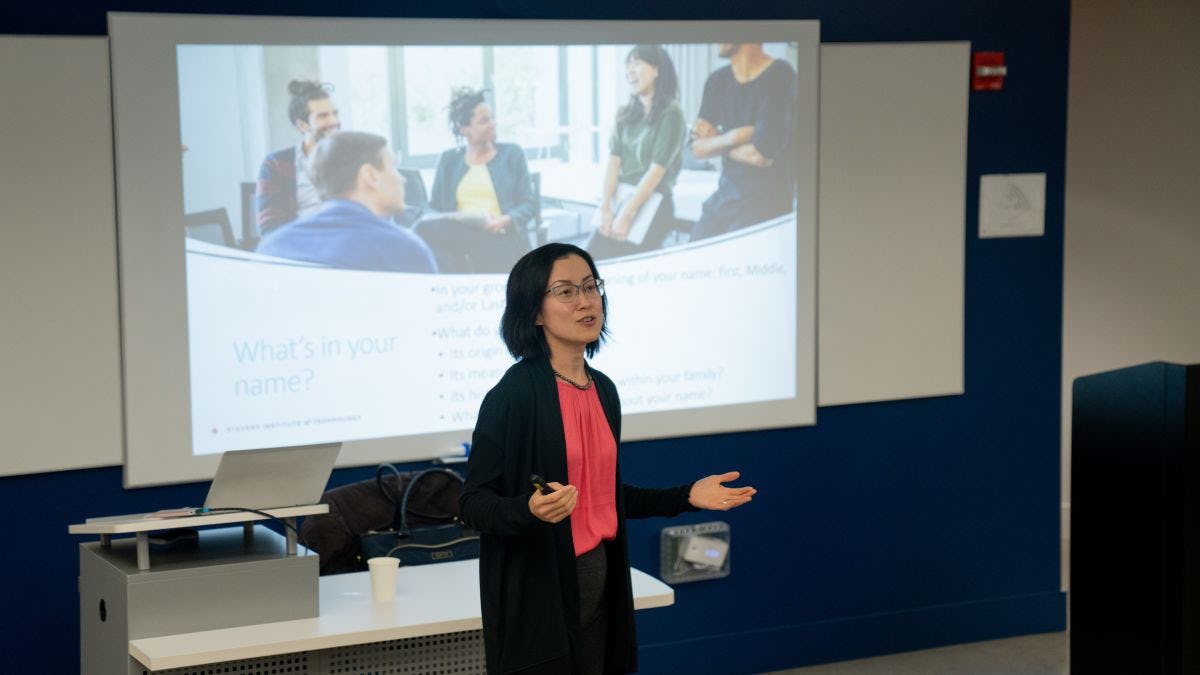
Master's in Management
Program Details
Degree
Master of ScienceSchool
School of BusinessDepartment
School of Business Graduate ProgramAvailable
On Campus & OnlineGain essential business skills with real-world experiences to make an immediate impact at work in just 12 months.
Program Highlights
Business Foundation for Non-Business Majors: The M.S. in Management (MSM) provides an ideal entry point into the business world for individuals without an undergraduate business background, offering fundamental skills and knowledge essential for successful careers across industries.
Tech-Infused Business Curriculum: With technology at the forefront, our curriculum delivers traditional business disciplines through a technological lens, ensuring graduates are well-equipped to navigate the modern corporate landscape.
Essential Concepts for Career Success: The program imparts critical fundamental concepts vital for success in today's corporate environment, catering to the majority of college graduates who will inevitably engage with businesses throughout their careers.
Gateway to Corporate Landscape: By bridging the gap between non-business backgrounds and the corporate world, the MSM program equips students with the necessary tools and mindset to thrive in diverse business settings.
Future-Proof Your Career Path: With a strong emphasis on technology and its intersection with business, this allows you to stay ahead of new technologies, emerging trends and industry disruptions.
GMAT/GRE test scores are optional for all master’s programs. Applicants who think that their test scores reflect their potential for success in graduate school may submit scores for consideration.
Management for the Digital Era
Engineering, science and math skills are highly sought after by employers, but recent college graduates in these disciplines often have difficulty distinguishing themselves in order to get the jobs in which they are most interested.
The Stevens master's degree in Management helps students with limited exposure to business to round out their résumés with practical instruction that teaches them how leadership, innovation, economics and strategy shape and define the roles they'll play in industry. The Management program can be completed in just 12 months, making it the perfect complement to a four-year bachelor's degree, and is available entirely online for maximum convenience.
Employers see graduates of the Stevens Management program as ideal job candidates who need little training, as their education prepares them to create immediate impact at work.
At the School of Business, going back to school right after completing an undergraduate degree doesn't mean putting the real world on hold. As a Management student, you'll gain firsthand experience through a curriculum shaped by input from the executives on the program's advisory board. Stevens also offers the Industry Capstone Program course and opportunities to meet corporate managers, both helpful as you strengthen your professional network in search of impactful employment opportunities.
Online Program
The Management master's program at Stevens is available on campus or fully online. Visit the link below to learn more about and apply to the online program.
Management Careers
Audit Associate
Business Advisory Associate
Data Engineer
Planning Assistant
Selling Manager
Tax Associate
Organizations hiring Management graduates include companies such as: Deloitte, Hangzhou Bank, KPMG, Merck, PwC, Ralph Lauren and more.
Admission Criteria
The 30-credit master's degree in Management is designed for students with bachelor's degrees in the engineering, science or liberal arts disciplines who want to understand how their academic training can be applied to help them succeed in a business setting. Coursework demonstrates, through hands-on, applied learning, how technical expertise fits into the organizational picture, and prepares professionals to confidently lead people and projects.
Interviews
Stevens often invites master's candidates to interview prior to making an admissions decision. If you are selected for an interview after submitting your application, you will receive instructions via email.
Professional Resume
You must include a résumé with your application that highlights:
Academic record
Work and internship experience
Leadership abilities
Letters of Recommendation
Your application must include two letters of recommendation. The strongest applications will include one letter from a current supervisor, and one from a former supervisor or previous employer who can speak to your leadership potential and discuss your professional performance.
Academic Transcripts
Your application must include official transcripts from all universities you have attended. These records must show your name, the name of the university attended, enrollment dates, coursework completed, and grades assigned.
Application Deadlines
APPLICANT | FALL | SPRING | SUMMER (Domestic Applicants Only) |
|---|---|---|---|
Master's Full-Time | April 15 | November 1 | May 1 |
Master's Part-Time | August 15 | January 1 | May 1 |
Graduate programs admit students on a "rolling" basis, meaning that students may still apply after the preferred deadlines.
Students requiring an F1 Visa are strongly encouraged to apply by the preferred deadlines to allow time for visa processing.
GMAT/GRE test scores are optional for all master’s programs. Applicants who think that their test scores reflect their potential for success in graduate school may submit scores for consideration.
Core Curriculum
Students must choose two additional electives from within the School of Business or from other Schools at Stevens.
MGT 506 Economics for Managers - 3 Credits
This course introduces managers to the essence of business economics – the theories, concepts and ideas that form the economist’s tool kit encompassing both the microeconomic and macroeconomic environments. Microeconomic topics include demand and supply, elasticity, consumer choice, production, cost, profit maximization, market structure, and game theory while the Macroeconomic topics will be GDP, inflation, unemployment, aggregate demand, aggregate supply, fiscal and monetary policies. In addition the basic concepts in international trade and finance will be discussed.
MGT 609 Fundamentals of Project Management - 3 Credits
This course deals with the basic problems of managing a project, defined as a temporary organization built for the purpose of achieving a specific objective. Both operational and conceptual issues will be considered. Operational issues include definition, planning, implementation, control, and evaluation of the project. Conceptual issues include project management vs. hierarchical management, matrix organization, project authority, motivation, and morale. Cases will be used to illustrate problems in project management and how to resolve them.
MGT 641 Marketing Management - 3 Credits
The study of marketing principles from the conceptual, analytical, and managerial points of view. Topics include: strategic planning, market segmentation, product life-cycle, new product development, advertising and selling, pricing, distribution, governmental, and other environmental influences as these factors relate to markets and the business structure.
MGT 657 Operations Management - 3 Credits
This course covers the general area of management of operations, both manufacturing and non-manufacturing. The focus of the course is on productivity and total quality management. Topics include quality control and quality management, systems of inventory control, work and materials scheduling, and process management.
MGT 671 Technology and Innovation Management - 3 Credits
This course introduces the student to topics in the management of technology and examines the critical role of technology as a strategic resource to enable management to achieve organizational objectives. Topics include entrepreneurship, developing and managing new ventures, managing innovation, the technology life-cycle and technology forecasting, management of research and development (R&D) personnel and projects, evaluation of R&D projects, and integrating technology strategy with the organization’s overall business strategy.
MGT 689 Organizational Behavior and Design - 3 Credits
This course exposes students to the macro and micro aspects of organizational behavior and theory that are essential to technology management. The macro aspects will focus on structural contingency theory as an approach to effective organizational design. The micro aspects will focus on leadership, teams, and individual behavior (e.g., motivation, job attitudes). Specific issues and problems which are covered include: the relationship of the organization with the external environment, the influence of the organization's strategies, culture, size, and production technology on the organization's design, and strategies for managing organizational processes such as teams, conflict, power/politics and organizational change. Current topics, that are key to technology management (e.g., virtual teams), will be stressed.
MGT 699 Strategic Management - 3 Credits
An interdisciplinary course which examines the elements of, and the framework for, developing and implementing organizational strategy and policy in competitive environments. The course analyzes management problems both from a technical-economic perspective and from a behavioral perspective. Topics treated include: assessment of organizational strengths and weaknesses, threats, and opportunities; sources of competitive advantage; organizational structure and strategic planning; and leadership, organizational development, and total quality management. The case method of instruction is used extensively in this course.
FIN 515 Financial Decision Making - 3 Credits
Corporate financial management requires the ability to understand the past performance of the firm in accounting terms; while also being able to project the future economic consequences of the firm in financial terms. This course provides the requisite survey of accounting and finance methods and principles to allow technical executives to make effective decisions that maximize shareholder value.
Meet the Program Director
Brian Rothschild currently works as Assistant Dean for Graduate Studies as well as the Senior Director of Management Programs at Stevens Institute of Technology School of Business. He has been in higher education for over 30 years in both technology and business education. Brian has worked extensively in business process reengineering as well as running international and domestic conferences. Brian has a passion for helping students in every aspect of their life as they begin their careers or are using education to move up the corporate ladder faster.
Brian earned his doctorate in Organizational Leadership from Nova Southeastern University, an MS in Educational Psychology from Fordham University and a MBA in Organizational Behavior and a BA in Economics from Iona University.
Frequently Asked Questions (FAQs)
What does MS in Management stand for?
It stands for Master of Science in Management and is ideal for individuals with diverse academic and professional backgrounds. An MSM degree emphasizes practical problem-solving, critical thinking, and innovative management techniques, offering a versatile pathway to leadership positions in a rapidly evolving business landscape.
What are the M's of management?
Business management is typically structured into money, manpower, machines, materials, and methods. These five M's form the foundation of business management.
You May Recognize This Program As...
MS in Leadership & Management
Master's in Strategic Management
MS Entrepreneurial Leadership
MiM






